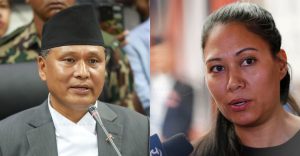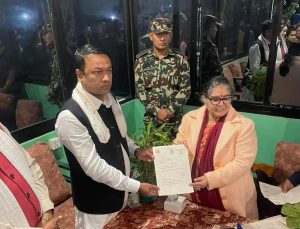Kathmandu — A new political party named Ujyalo Nepal Party is set to file its registration application at the Election Commission on Tuesday, signaling the beginning of a new political chapter in Nepal.
The initiative, associated with Kulman Ghising, the former managing director of the Nepal Electricity Authority known for ending the country’s power crisis, has been under preparation for several months. According to insiders, the party has finalized the name Ujyalo Nepal and selected an electric bulb as its election symbol.
Although Ghising currently serves as a government minister, sources say he will not immediately join the party but may take an active political role within a month. The party will be led by former Energy Secretary Anup Kumar Upadhyay, who has been appointed as the coordinator of a 51-member central committee.
The new political force aims to bring together experienced technocrats and reform-oriented youth under one platform. Discussions are ongoing with former lawmakers, including Sumana Shrestha, who recently left the Rastriya Swatantra Party (RSP).
Leadership Dispute Between Ghising and Shrestha
Despite initial efforts toward unity, Sumana Shrestha and Kulman Ghising eventually decided to move forward separately. Speaking to , Shrestha confirmed the split, saying, “He has moved ahead. I wish him all the best.”
Sources close to Shrestha said she was ready to support Ghising as the party’s chairperson but became dissatisfied after he proposed Upadhyay for the top position. Her side had urged Ghising to resign from his ministerial post and personally lead the organization, emphasizing the need for a people-centered leadership approach.
Shrestha’s team also disagreed with the party’s name and symbol. They argued that Ujyalo Nepal appeared too personalized and proposed alternatives such as Nepal Vikas Dal or Nepal Janasewa Party.
Insiders describe the disagreement as a clash between technocratic leadership and generational activism. Shrestha’s faction, inspired by the Gen-Z movement, preferred a collective leadership model that reflected inclusivity and social reform.
“After a youth-driven movement, the leadership should also represent that generation,” one of her aides said, adding that appointing a former bureaucrat contradicted the spirit of the movement.
On social media, Shrestha wrote:
“Let’s move away from personality-centered politics. Instead of a single hero, the party should stand for clear ideas and public-interest action.”
Possible Collaboration Ahead
Although both sides are currently following different strategies, they have not ruled out the possibility of collaboration during future elections. Shrestha said, “We might come together as an alliance when the elections arrive.”
With the registration set for Tuesday, Ujyalo Nepal Party is expected to officially enter Nepal’s political arena — combining technocratic leadership with reformist goals, and reigniting discussion on how new-generation politics can reshape the country’s democratic landscape.






